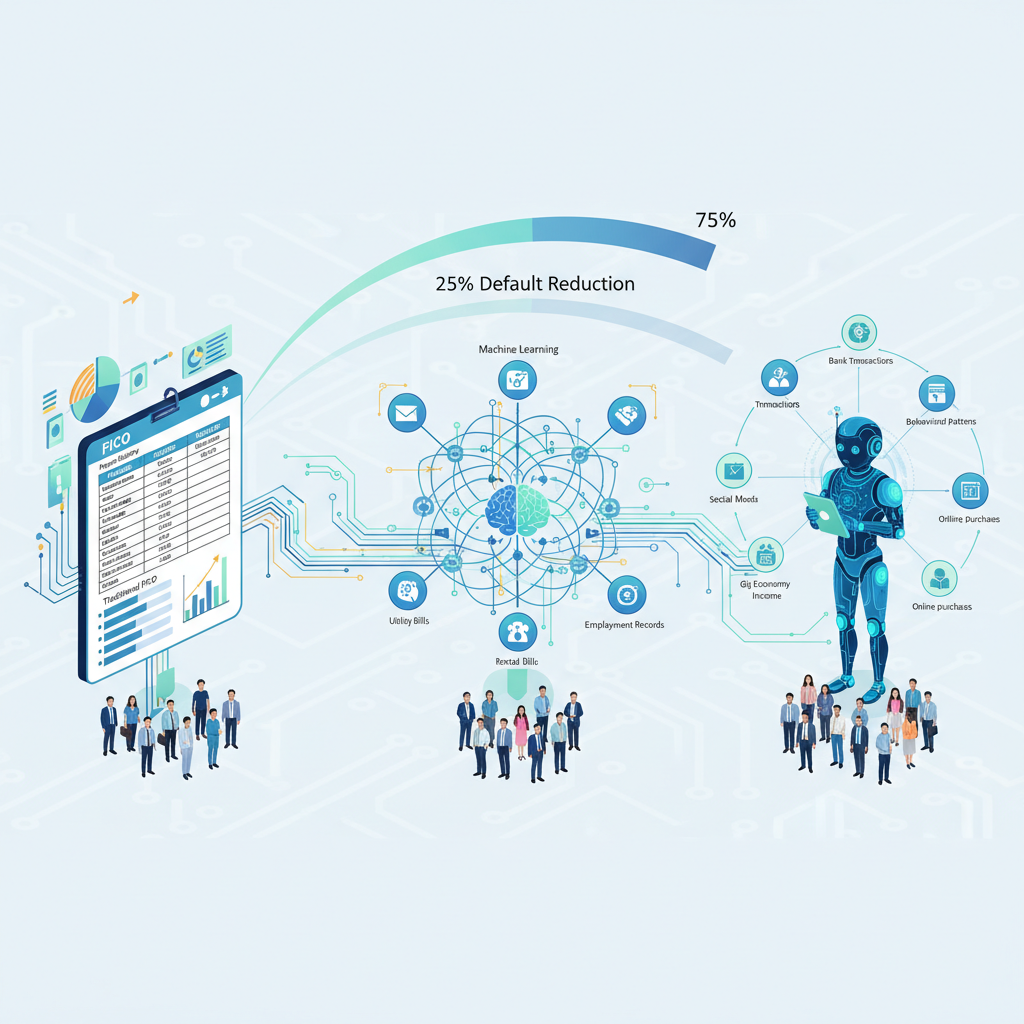
Frameworks, core principles and top case studies for SaaS pricing, learnt and refined over 28+ years of SaaS-monetization experience.
Thank you! Your submission has been received!
Oops! Something went wrong while submitting the form.
Join companies like Zoom, DocuSign, and Twilio using our systematic pricing approach to increase revenue by 12-40% year-over-year.

In the evolving landscape of financial services, credit scoring stands as a critical pillar supporting lending decisions. Traditional methods have served the industry for decades, but a new player has entered the arena – agentic AI. This advanced form of artificial intelligence isn't just analyzing data; it's actively reasoning, learning, and making nuanced decisions about creditworthiness. For financial institutions seeking competitive advantage, understanding this shift isn't optional—it's imperative.
Credit scoring began as a simple statistical model in the 1950s when Bill Fair and Earl Isaac created what would become the FICO score. This revolutionary approach transformed lending from relationship-based decisions to data-driven assessments.
Fast forward to today, and we're witnessing another revolution. Traditional credit scoring systems typically analyze:
While effective, these systems have notable limitations:
Enter credit scoring AI systems, which are addressing these limitations by incorporating alternative data sources and more sophisticated analytical approaches.
Agentic AI represents the next evolutionary step beyond basic AI implementations. Unlike conventional algorithms that follow predetermined pathways, agentic systems demonstrate:
In financial risk assessment, these capabilities translate to systems that don't just score credit—they understand it.
According to a 2023 report by McKinsey, financial institutions implementing agentic AI in their credit operations have seen up to 25% reduction in default rates while simultaneously increasing approval rates by 15% for traditionally underserved populations.
Traditional credit scoring examines what you've done with credit. Agentic AI examines what you do with money.
Upstart, a lending platform leveraging AI, analyzes over 1,000 variables and sophisticated algorithms that go far beyond FICO scores. According to their public reporting, this approach has enabled them to approve 173% more borrowers than traditional models with the same loss rates.
Their system doesn't just look at credit history but evaluates:
Unlike static scoring models, agentic AI continuously reassesses risk based on real-time data. Affirm, the buy-now-pay-later provider, uses this approach to make instant credit decisions at the point of purchase.
Their system makes over 100 million predictions daily, allowing them to extend credit to consumers who might be declined by traditional methods. Their 2023 annual report indicates a 20% higher approval rate with no corresponding increase in defaults, thanks to their sophisticated financial intelligence systems.
Risk isn't just about ability to repay—it's also about legitimacy. Agentic AI systems excel at connecting credit risk assessment with fraud prevention.
PayPal's risk assessment engine analyzes millions of transactions to separate legitimate financial activity from suspicious patterns. This integrated approach has reduced their fraud rate to 0.32% of revenue, significantly below industry averages, while maintaining high approval rates.
The implementation of agentic AI in credit scoring delivers tangible business results:
Financial institutions report 30-40% increases in serviceable markets by safely lending to previously "invisible" consumers. ZestFinance (now Zest AI) demonstrated this by helping one regional bank increase loan approvals by 15% with no additional risk, specifically by better evaluating thin-file applicants.
Goldman Sachs reported that their AI-powered lending platform reduced the time required for loan decisions from 3-4 weeks to just minutes, while simultaneously reducing operational costs by 40%.
Morgan Stanley's research indicates that AI-enhanced credit models have demonstrated up to 25% better predictive power than traditional approaches in identifying potential defaults.
Despite the compelling benefits, financial institutions face significant hurdles when implementing agentic AI for credit scoring:
Explainability remains a critical regulatory requirement. The "black box" nature of some AI models conflicts with regulations like the Equal Credit Opportunity Act that mandate specific reasons for adverse actions.
Solutions are emerging, however. Firms like H2O.ai and DataRobot now offer explainable AI platforms specifically designed for credit decisions that can generate the documentation required for regulatory compliance.
Agentic AI is only as good as the data it learns from. Financial institutions typically store customer data across disparate legacy systems, creating integration challenges.
JPMorgan Chase addressed this by creating a unified data platform before implementing their AI risk assessment tools, a project that required significant investment but delivered a reported 360-degree view of customer financial behavior.
Without careful design, AI systems can perpetuate or even amplify existing biases in lending.
FICO's recent partnership with EqualityAI represents a growing trend of building fairness directly into credit scoring algorithms, with their joint solution showing a 70% reduction in approval disparities across demographic groups.
Looking ahead, we can expect:
Increased personalization: Credit products tailored to individual financial patterns rather than broad risk categories
Continuous assessment: Moving away from point-in-time scores to dynamic, real-time creditworthiness evaluations
Predictive interventions: Identifying and addressing potential defaults before they occur
Cross-domain integration: Combining financial data with broader behavioral insights for more accurate risk prediction
Financial institutions looking to leverage agentic AI for credit scoring should consider these strategic steps:
Audit your data infrastructure: Successfully implementing AI begins with accessible, clean data from across your organization
Start with hybrid approaches: Augment rather than replace existing credit models while building confidence in AI solutions
Invest in explainability: Prioritize solutions that provide transparent reasoning for credit decisions
Build cross-functional expertise: Create teams that blend financial risk knowledge with data science capabilities
Establish ethical guidelines: Develop clear principles to ensure fair lending practices in your AI implementations
The transformation of credit scoring through agentic AI represents more than a technological shift—it's a fundamental reimagining of financial risk assessment. For forward-thinking financial institutions, this evolution offers the opportunity to make lending more inclusive, efficient, and accurate while better serving both shareholders and customers.
The question is no longer whether agentic AI will transform credit scoring, but how quickly financial institutions will adapt to this new reality.

Join companies like Zoom, DocuSign, and Twilio using our systematic pricing approach to increase revenue by 12-40% year-over-year.